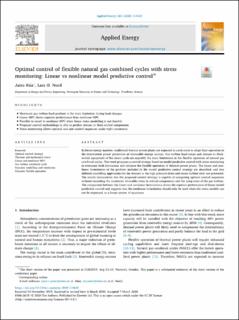Optimal control of flexible natural gas combined cycles with stress monitoring: Linear vs nonlinear model predictive control
Peer reviewed, Journal article
Published version

Åpne
Permanent lenke
https://hdl.handle.net/11250/2648795Utgivelsesdato
2020Metadata
Vis full innførselSamlinger
Sammendrag
In future energy markets, traditional thermal power plants are expected to cycle more to adapt their operation to the intermittent power generation of renewable energy sources. Gas turbine load ramps and stresses in thick-walled equipment of the steam cycle are arguably the main limitations in the flexible operation of natural gas combined cycles. This work proposes a control strategy based on model predictive control with stress monitoring to overcome both limitations and enhance the flexible operation of thermal power plants. The linear and nonlinear formulation of the problem included in the model predictive control strategy are described, and two different modelling approaches for the stresses in the high pressure drum and steam turbine rotor are presented. The results demonstrate that the proposed control strategy is capable of computing optimal control sequences without exceeding the maximum allowable stress in critical components and the ramp rates of the gas turbine. The comparison between the linear and nonlinear formulations shows the superior performance of linear model predictive control and suggests that the nonlinear formulation should only be used when the stress models can not be expressed as a linear system of equations.
